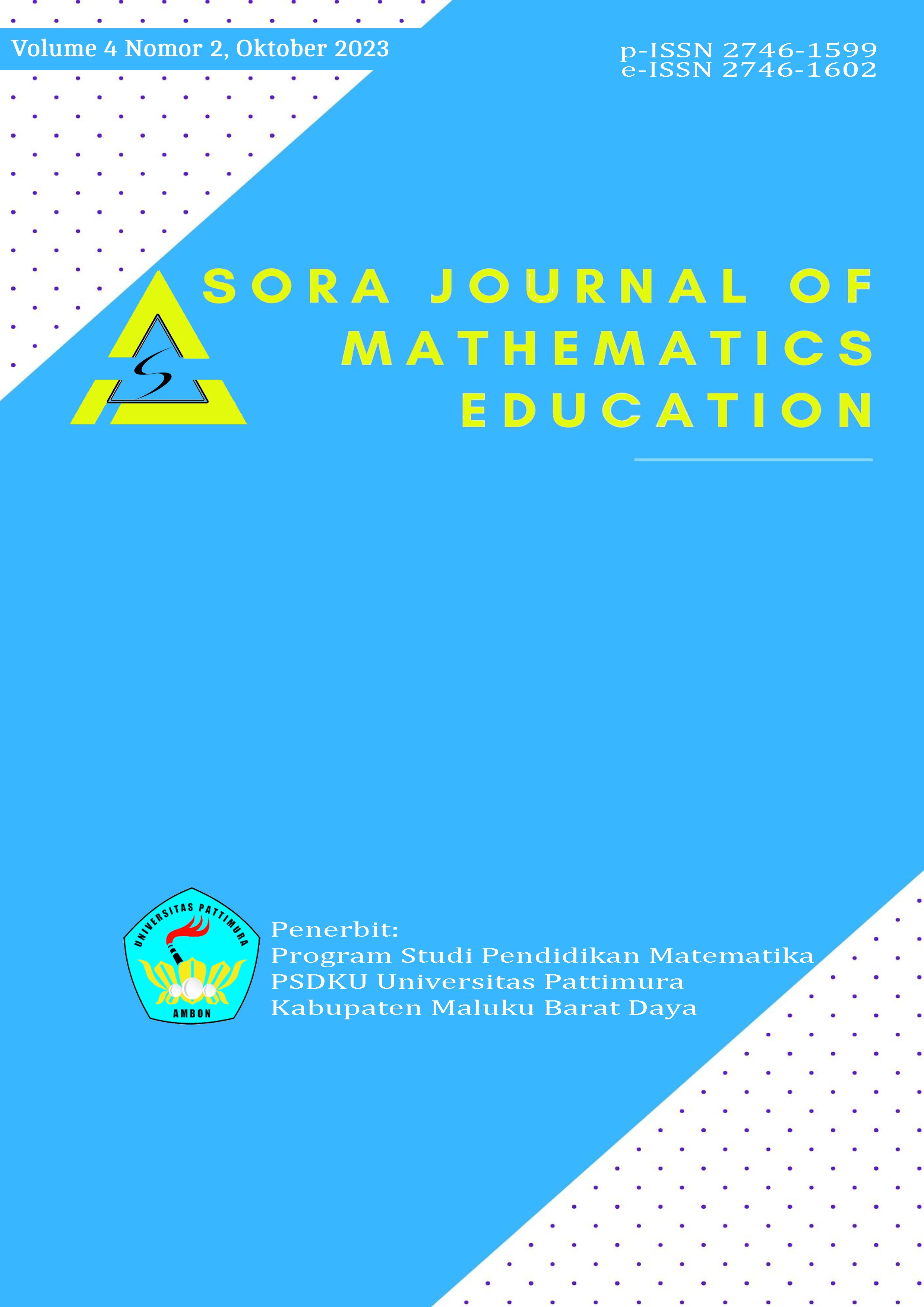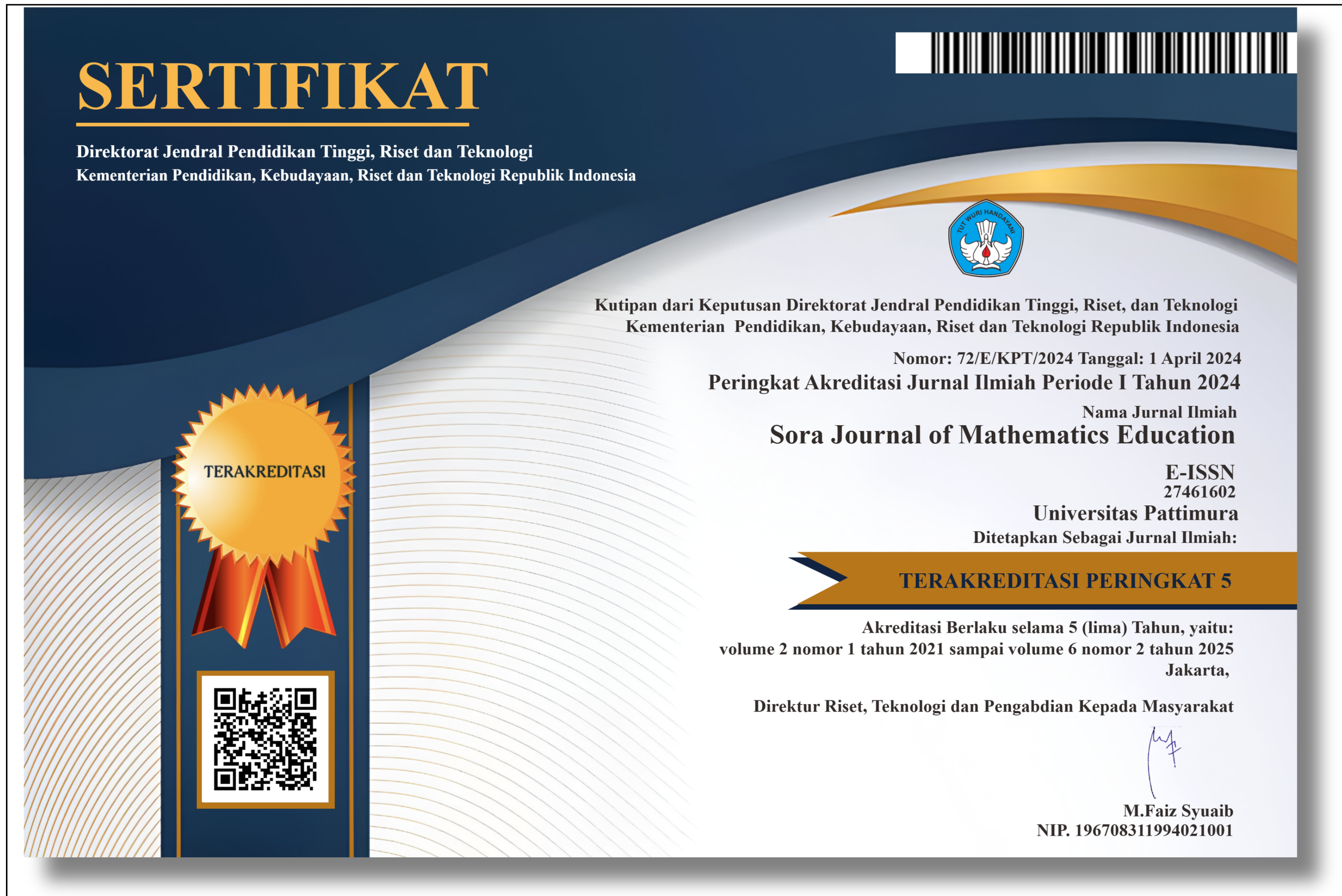DO TEACHERS GIVE DIAGNOSTIC ASSESSMENT TO MEASURE STUDENTS’ MISCONCEPTION?
APAKAH GURU MELAKUKAN ASESMEN DIAGNOSTIK UNTUK MENGUKUR MISKONSEPSI SISWA?
Abstract
The importance of diagnostic assessment should be realized by teachers. This paper presents the results of a qualitative study on teachers’ perspective about diagnostic assessment. Teachers were interviewed about their perspective regarding the importance of giving diagnostic assessment to measure students’ misconception and also the implementation of diagnostic assessment. The result showed that the teacher only diagnosed students’ ability not giving the a diagnostic test to measure misconception. Thus, the government can give socialization about diagnostic testing to the teachers so that teachers will be more aware in utilizing diagnostic testing to measure students’ misconception.
Downloads
References
Ayieko, R. A., Moreano, G., & Harter, L. (2022). A cross-national comparison of fourth and eighth grade students’ understanding of fraction magnitude. International Electronic Journal of Mathematics Education, 17(4), em0703. https://doi.org/10.29333/iejme/12287
Bütüner, S. Ӧnder, & Filiz, M. (2016). Exploring High-Achieving Sixth Grade Students Errorneous Answers and Misconceptions On the Angle Concept. International Journal of Mathematical Education in Science and Technology, 1–22.
Dersch, A.-S., Heyder, A., & Eitel, A. (2022). Exploring the Nature of Teachers’ Math-Gender Stereotypes: The Math-Gender Misconception Questionnaire. Frontiers in Psychology, 13. https://doi.org/10.3389/fpsyg.2022.820254
Fulton, L., Lieneck, C., Ramamonjiarivelo, Z., Kruse, C. S., & Brooks, M. S. (2021). Competency assessment of an undergraduate program using a third-party, objective pre-post examination. BMC Medical Education, 21(1), 21. https://doi.org/10.1186/s12909-020-02448-z
Holmes, W., & Brian, F. (2019). Educational and Psychological Measurement. Routledge.
Kurniati, R. M., Ruslan, & Ihsan, H. (2018). Miskonsepsi Siswa Sekolah Menengah Pertama (SMP) terhadap Bilangan Bulat, Operasi dan Sifat-Sifatnya. Intelegensi JURNAL ILMU PENDIDIKAN, 1(1).
Koretsky, M. D., McColley, C. J., Gugel, J. L., & Ekstedt, T. W. (2022). Aligning classroom assessment with engineering practice: A design-based research study of a two-stage exam with authentic assessment. Journal of Engineering Education, 111(1), 185–213. https://doi.org/10.1002/jee.20436
Lee, J.-E., Pak, B., & Lim, W. (2021). Building Preservice Teachers’ Diagnostic Competence: An Exploratory Study in the Domain of Fractions. Mathematics, 9(16), Article 16. https://doi.org/10.3390/math9161870
Lowe, T. W. (2015). Online Quizzes For Distance Learning of Mathematics. Teaching Mathematics and Its Applications, 138–148.
Mohyuddin, R. G., & Khalil, U. (2016). Misconceptions of Students in Learning Mathematics at Primary Level. Bulletin of Education and Research, 38(1), 133–162.
Pandra, V., Sugiman, & Mardapi, D. (2017). Development of Mathematics Achievement Test for Third Grade Students at Elementary School in Indonesia. International Electronic Journal of Mathematics Education, 12, 769–776.
Richardson, M. (2022). Rebuilding Public Confidence in Educational Assessment. In UCL Press: London, UK. (2022). UCL Press. https://doi.org/10.14324/111.9781787357242
Roselizawati, H., Sarmadi, H., & Shahrill, M. (2014). Understanding Students’ Mathematical Errors and Misconceptions: The Case of Year 11 Repeating Students. Mathematics Education Trends and Research, 1–10.
Santrock, J. W. (2018). Educational Psychology. McGraw-Hill Education.
Shanley, L., Clarke, B., Smolkowski, K., Doabler, C. T., Kurtz-Nelson, E. C., & Fien, H. (2021). Examining the Role of Domain–General Skills in Mathematics Learning and Intervention Response in Kindergarten. Learning Disabilities Research & Practice, 36(4), 330–352. https://doi.org/10.1111/ldrp.12267
Shim, G. T. G., Shakawi, A. M. H. A., & Azizan, F. L. (2017). Relationship between Students’ Diagnostic Assessment and Achievement in a Pre-University Mathematics Course. Journal of Education and Learning, 6(4), 364. https://doi.org/10.5539/jel.v6n4p364
titleTranslation:
Soeharto, S. (2021). Development of a Diagnostic Assessment Test to Evaluate Science Misconceptions in Terms of School Grades: A Rasch Measurement Approach. Journal of Turkish Science Education, 18(3), 351–370. https://eric.ed.gov/?id=EJ1325560
Soleh, A., Khumaedi, M., & Pramono, S. E. (2017). Pengembangan Instrumen Penilaian Mata Pelajaran PKn Standar Kompetensi Memahami Kedaulatan Rakyat Dalam Sistem Pemerintahan di Indonesia. Journal of Educational Research and Evaluation, 6(1), 71–80. https://doi.org/10.15294/jrer.v6i1.16210
Spillane, J. P., Seelig, J. L., Blaushild, N. L., Cohen, D. K., & Peurach, D. J. (2019). Educational System Building in a Changing Educational Sector: Environment, Organization, and the Technical Core. Educational Policy, 33(6), 846–881. https://doi.org/10.1177/0895904819866269
Tarmo, A., & Kimaro, A. (2021). The teacher education curriculum and its competency-based education attributes. The Journal of Competency-Based Education, 6(3), e01255. https://doi.org/10.1002/cbe2.1255
Tracy, S. J. (2020). Qualitative Research Methods: Collecting Evidence, Crafting Analysis, Communicating Impact (Second Edition). Wiley Blackwell.
Widyatmoko, A., & Shimizu, K. (2018). Literature Review of Factors Contributing to Students’ Misconceptions in Light and Optical Instruments. International Journal of Environmental & Science, 13, 853–863.
Wijaya, A., Retnawati, H., Setyaningrum, W., Aoyama, K., & Sugiman, S. (2019). DIAGNOSING STUDENTS’ LEARNING DIFFICULTIES IN THE EYES OF INDONESIAN MATHEMATICS TEACHERS. Journal on Mathematics Education, 10(3), 357–364. https://doi.org/10.22342/jme.10.3.7798.357-364
Copyright (c) 2023 Sora Journal of Mathematics Education

This work is licensed under a Creative Commons Attribution 4.0 International License.








.jpg)



